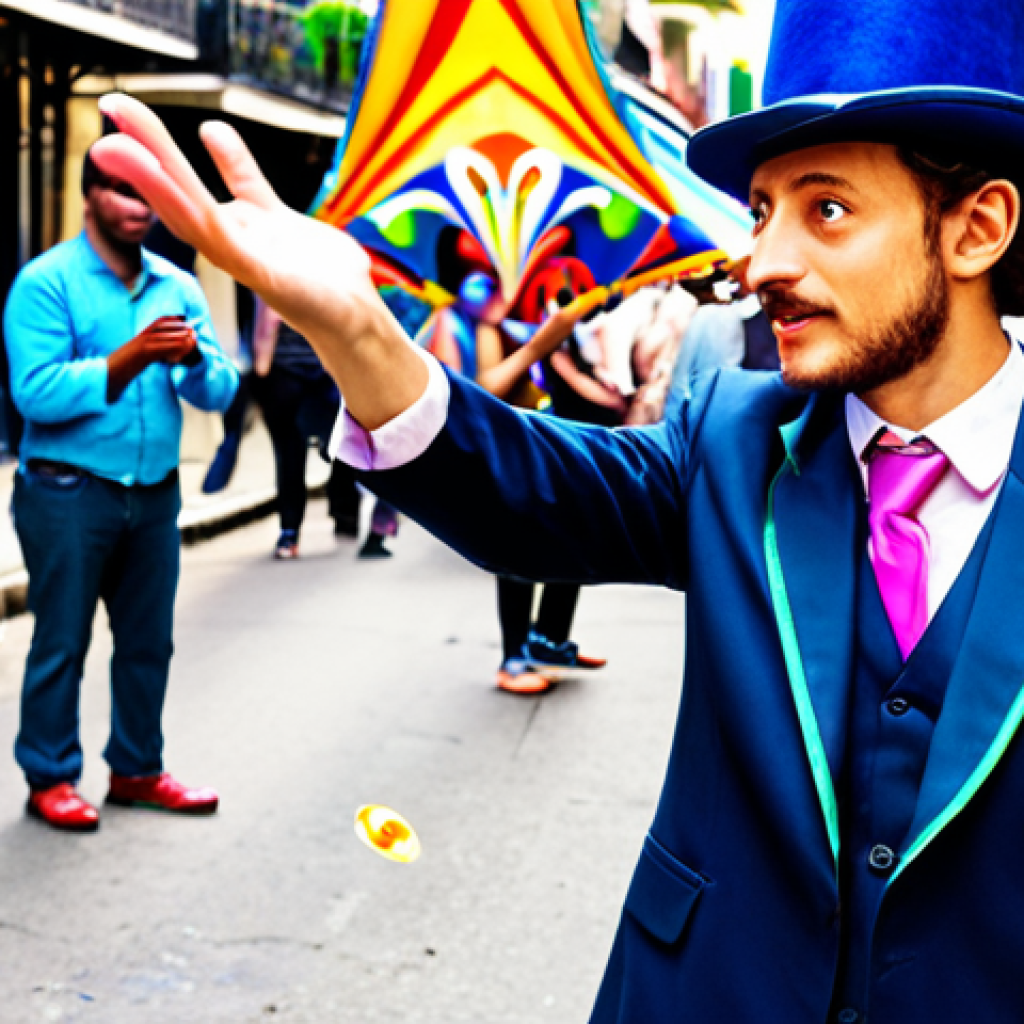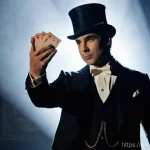Alright, let’s dive into the captivating world of magic! From the dazzling illusions of David Copperfield to the mind-bending mentalism of Derren Brown, magic performances continue to enthrall audiences worldwide.
It’s not just about pulling rabbits out of hats anymore; modern magic seamlessly blends storytelling, psychology, and cutting-edge technology to create unforgettable experiences.
I’ve always been fascinated by how magicians manage to suspend our disbelief, even for a moment, transporting us to a realm where anything seems possible.
Plus, I think that with the rise of digital magic tricks on platforms like TikTok and Instagram, the art form is constantly evolving and reaching new audiences.
Let’s explore this mesmerizing art form in more detail!
Okay, here we go.
The Psychology Behind the Illusion

What is it about magic that makes us so susceptible to being fooled? It’s not just about naivety; it’s deeply rooted in how our brains are wired. Magicians are masters of exploiting cognitive biases, those mental shortcuts our brains take to process information quickly. For instance, they often use misdirection, drawing our attention to one thing while they subtly manipulate something else entirely. Our brains can only focus on so much at once, and magicians capitalize on this limitation. Think about it – how many times have you watched a magic trick and thought, “I know they’re doing something tricky with their hands,” but you just can’t quite catch it? That’s misdirection in action. It’s not just about the sleight of hand; it’s about understanding where our attention is naturally drawn and then subtly shifting it.
Attention and Misdirection
Magicians carefully control our focus. By using captivating stories, dramatic gestures, or simply pointing our gaze in a certain direction, they can effectively hide their true actions. I remember watching a street magician in New Orleans who used a ridiculously flamboyant handkerchief to distract the crowd while he palmed a coin. Everyone was so focused on the bright colors and waving motion that they completely missed the crucial moment when the coin vanished. It was a perfect example of how a well-placed distraction can make the impossible seem real. It also illustrates why practice is so important. The more fluid the movement, the less likely the audience is to suspect the trick.
The Power of Suggestion
Suggestion plays a huge role in magic. Magicians often use language to subtly influence our perceptions and expectations. By framing a trick in a certain way, they can create a narrative that makes the impossible seem plausible. For example, a mentalist might say, “I’m going to try to read your mind,” which immediately primes the audience to believe that some form of psychic connection is possible. I saw a performance where the magician asked a volunteer to simply think of a number between 1 and 10. Then, he said “I feel like it’s going to be an odd number.” He then asked, “Is it a 7?” and the audience member was shocked that it was correct. It seems that there was an element of suggestion in getting the volunteer to pick a number between 1 and 10. These tricks usually work best when the audience member isn’t aware of the power of suggestion. It’s all about creating the illusion of control while subtly guiding our thoughts.
From Stage to Screen: The Evolution of Magic
Magic has undergone a significant transformation over the years. Gone are the days of purely theatrical stage shows. Now, we see magic integrated into television, film, and even online platforms. Think about the elaborate illusions in movies like “Now You See Me” or the mind-blowing stunts performed by David Blaine on television. The incorporation of technology has also opened up new possibilities, allowing magicians to create illusions that were once unimaginable. Digital magic, as I mentioned earlier, has become increasingly popular, with magicians using apps and social media to perform tricks that blur the lines between reality and virtuality. It’s an exciting time for the art form, as it continues to adapt and evolve in the digital age. I recently tried out an augmented reality magic app, and it was mind-blowing to see virtual objects seemingly interact with the real world. It made me realize that the future of magic is not just about what’s possible on stage, but also what’s possible with technology.
The Impact of Technology
Technology has revolutionized the way magic is performed and experienced. From holographic illusions to interactive apps, the possibilities are endless. One of the most fascinating developments is the use of augmented reality to create seamless blends of the real and virtual worlds. For example, a magician could use an AR app to make objects appear to float in mid-air or to transform one object into another right before our eyes. This kind of technology not only enhances the visual spectacle of magic but also opens up new avenues for audience interaction and engagement. It’s also cheaper than other forms of magic, since there are no physical objects involved. It makes magic more accessible to the masses, and makes it more common for kids to want to become magicians.
The Rise of Digital Magic
Social media platforms like TikTok and Instagram have become breeding grounds for digital magic. Magicians are now creating short, engaging videos that showcase their skills to a global audience. These digital tricks often involve clever editing, camera angles, and special effects, creating illusions that are both captivating and shareable. The accessibility of these platforms has also democratized the art form, allowing anyone with a smartphone to become a magician. While some might argue that digital magic lacks the same level of skill and artistry as traditional stage magic, there’s no denying its widespread appeal and its ability to reach new audiences. Digital magic also makes it easy for new fans to appreciate magic.
The Art of Close-Up Magic
Close-up magic is, in my opinion, one of the most intimate and impressive forms of magic. It involves performing illusions right under the audience’s noses, often using everyday objects like cards, coins, and rubber bands. What makes close-up magic so captivating is the level of skill and dexterity required. Magicians must not only master the sleight of hand but also possess the ability to engage with the audience on a personal level. I’ve seen close-up magicians perform tricks that were so seamless and deceptive that I couldn’t believe my eyes. It’s a testament to the power of practice, precision, and showmanship. Plus, there is a sense of shared experience that you get when you are watching a magician perform so close to you.
Mastering Sleight of Hand
Sleight of hand is the foundation of close-up magic. It involves using subtle movements and techniques to manipulate objects without the audience noticing. This requires countless hours of practice and a deep understanding of the physics of motion. One of the most common sleight-of-hand techniques is palming, which involves secretly holding an object in the hand while appearing to be empty. Another popular technique is the double lift, which involves turning over two cards at once while appearing to turn over only one. Mastering these techniques takes dedication and patience, but the results are well worth the effort. If the magician doesn’t practice, then it is much more difficult to convince the audience that he has special powers.
Creating a Personal Connection
Close-up magic is not just about skill; it’s also about creating a personal connection with the audience. Magicians must be able to engage with their spectators, making them feel like they are part of the performance. This involves using humor, storytelling, and genuine interaction to build rapport. I’ve seen magicians who could not only perform incredible tricks but also make their audience feel like they were the only people in the room. This ability to connect with people on a personal level is what truly sets great close-up magicians apart. People are more likely to enjoy magic if they can relate to the magician. After all, we’re all human, and we all have the same struggles in life.
The Business of Magic: Making a Living as a Magician
While the art of magic is captivating, turning it into a sustainable career requires business acumen and marketing skills. Magicians can generate income through various avenues, including performing at private events, corporate functions, and public shows. Many also offer magic lessons or sell magic-related products online. Building a strong brand and marketing oneself effectively is crucial for attracting clients and securing gigs. I know a magician who started out performing at children’s birthday parties and eventually built a successful career performing at corporate events and festivals. It’s a challenging but rewarding path for those who are passionate about their craft.
Diversifying Income Streams
Relying solely on performance fees can be risky, so it’s important for magicians to diversify their income streams. This might involve offering magic lessons, selling magic tricks or books, or creating online content such as tutorials or performance videos. Some magicians also create and sell their own original magic routines and illusions. By diversifying their income streams, magicians can create a more stable and sustainable career. It’s also a good idea to develop skills outside of magic, like website design and videography, in order to produce higher-quality content.
Marketing and Branding
In today’s competitive market, it’s essential for magicians to build a strong brand and market themselves effectively. This involves creating a professional website, using social media to promote their services, and networking with potential clients and industry professionals. Many magicians also create promotional videos showcasing their best tricks and performances. By investing in marketing and branding, magicians can increase their visibility and attract more bookings. One of the best ways to market yourself is to hand out business cards at events, so potential clients can contact you in the future. It’s also important to consider the overall look and feel of your brand, so your brand can become instantly recognizable.
Ethical Considerations in Magic

The world of magic, while seemingly innocent and entertaining, also grapples with ethical considerations. Should magicians reveal their secrets? What are the boundaries of using deception for entertainment? These questions spark debate within the magic community and raise important issues about trust, respect, and the preservation of mystery. I’ve always believed that magicians have a responsibility to maintain the integrity of their art form, which means respecting the secrets that underpin their illusions. But I also recognize that there’s a fine line between protecting those secrets and stifling creativity and innovation. It’s a complex issue with no easy answers.
The Magician’s Code
Many magicians adhere to a code of ethics that emphasizes the importance of protecting the secrets of magic. This code typically prohibits magicians from revealing their methods to non-magicians, as doing so would undermine the illusion and spoil the fun for others. However, some argue that this code is outdated and that sharing magic secrets can inspire creativity and innovation. Ultimately, the decision of whether or not to reveal magic secrets is a personal one, but it’s important to consider the potential impact on the art form. Many magic tricks require years of practice, so it’s disrespectful to reveal those secrets to the public.
The Boundaries of Deception
Magic is, by its very nature, based on deception. But where do we draw the line between harmless deception for entertainment purposes and unethical or misleading behavior? Some magicians have been criticized for using their skills to exploit or manipulate people, whether for personal gain or to promote a particular agenda. It’s important for magicians to be mindful of the potential impact of their actions and to use their skills responsibly. It’s also important to be transparent about the fact that magic is an illusion and not to claim any supernatural powers. Many people have had negative experiences with magicians, so it’s important to show them that magic can be ethical and fun.
The Future of Magic: Innovation and Adaptation
As technology advances and audience preferences evolve, the world of magic will continue to adapt and innovate. We’re already seeing new forms of magic emerge, such as virtual reality magic and interactive magic experiences. The challenge for magicians is to stay ahead of the curve, embracing new technologies and techniques while preserving the core principles of their art form. I believe that the future of magic is bright, as long as magicians are willing to experiment, innovate, and connect with their audiences in new and meaningful ways. After all, magic is not just about fooling people; it’s about creating wonder, inspiring awe, and reminding us that anything is possible.
Virtual Reality Magic
Virtual reality (VR) is opening up exciting new possibilities for magic. Magicians can now create immersive virtual environments where anything is possible, from making objects disappear to teleporting people to different locations. VR magic allows for a level of interactivity and realism that was previously impossible, creating truly unforgettable experiences for the audience. I recently saw a demo of a VR magic trick where I was able to reach into a virtual world and pull out a real object. It was an incredibly surreal and mind-bending experience that left me in awe. VR magic has the potential to completely transform the art form, making it more immersive, engaging, and interactive than ever before. The key is to make the VR experience feel real, which can be difficult to achieve.
Interactive Magic Experiences
Audiences are increasingly seeking interactive experiences that allow them to participate in the magic. This might involve choosing cards, solving puzzles, or even performing magic tricks themselves. Interactive magic experiences create a sense of connection and engagement that traditional stage magic often lacks. They also allow magicians to tailor their performances to the individual preferences of their audience. I’ve seen magicians use interactive apps to create personalized magic shows where the audience members can influence the outcome of the tricks. This level of interactivity not only makes the experience more fun and engaging but also creates a sense of shared ownership and collaboration. After all, it’s the audience members who make the magic happen.
Magic and Mental Health: A Surprising Connection
Believe it or not, magic can have a positive impact on mental health. Learning magic tricks can improve cognitive skills, boost self-confidence, and provide a sense of accomplishment. Performing magic can also be a great way to reduce stress, connect with others, and express creativity. I know several people who have used magic as a form of therapy, helping them to overcome anxiety, depression, and social isolation. It’s a testament to the power of magic to heal, inspire, and transform lives.
| Magic Style | Description | Key Elements | Popular Figures |
|---|---|---|---|
| Stage Magic | Large-scale illusions performed for a large audience. | Elaborate sets, assistants, dramatic presentation. | David Copperfield, Penn & Teller |
| Close-Up Magic | Intimate performances using everyday objects. | Sleight of hand, audience interaction, misdirection. | David Blaine, Ricky Jay |
| Mentalism | Creating the illusion of mind-reading or psychic abilities. | Suggestion, psychology, showmanship. | Derren Brown, Max Maven |
| Digital Magic | Magic tricks performed using technology and social media. | Video editing, augmented reality, app integration. | Zach King, Julius Dein |
Cognitive Benefits
Learning magic tricks can improve cognitive skills such as memory, attention, and problem-solving. Magicians must memorize complex routines, focus their attention on multiple tasks simultaneously, and think creatively to solve problems on the fly. These skills are not only valuable for performing magic but also for everyday life. I’ve found that learning magic has helped me to become more organized, focused, and mentally agile. It’s a great way to keep your mind sharp and challenge yourself in new ways. It is also a lot of fun to learn a new magic trick.
Boosting Self-Confidence
Performing magic can be a great way to boost self-confidence. Stepping on stage and captivating an audience requires courage, charisma, and a belief in oneself. As magicians gain experience and receive positive feedback, they develop a stronger sense of self-assurance and self-worth. I’ve seen shy and introverted people transform into confident performers after learning magic. It’s a powerful way to overcome fears, build self-esteem, and discover one’s hidden potential. In many ways, magic can empower people to become more confident and assertive.
In Conclusion
Magic, in its myriad forms, continues to captivate and evolve. From the psychology behind our susceptibility to illusion to the business of making a living as a magician, the art form is rich with possibilities. Whether you’re a seasoned performer or simply a curious spectator, the world of magic offers something for everyone – a sense of wonder, a challenge to the mind, and a reminder that the impossible may just be possible.
Useful Information
1. Consider starting with simple card tricks. A deck of cards is inexpensive and offers a wide range of tricks to learn.
2. YouTube is your friend. Many magicians share tutorials online. Look for reputable channels with clear instructions.
3. Practice makes perfect. Dedicate time to rehearse your tricks until they become second nature.
4. Join a local magic club. Connecting with other magicians can provide valuable feedback and support.
5. Start with close-up magic for a more intimate performance.
Key Takeaways
Magic is more than just tricks; it’s an art form that blends psychology, skill, and showmanship.
Technology is transforming magic, creating new possibilities for illusion and engagement.
Building a successful career in magic requires business acumen and marketing skills.
Ethical considerations are important in magic, particularly regarding the protection of secrets and the boundaries of deception.
Magic can have a positive impact on mental health, improving cognitive skills and boosting self-confidence.
Frequently Asked Questions (FAQ) 📖
Q: What makes modern magic different from traditional magic shows?
A: Traditional magic often relies on classic illusions and stagecraft, like pulling rabbits from hats or sawing someone in half. Modern magic, on the other hand, incorporates elements of storytelling, psychology, and even technology.
Think about Derren Brown’s mentalism, where he seems to read people’s minds, or magicians using augmented reality to create mind-blowing visual effects.
It’s less about pure deception and more about crafting an immersive and thought-provoking experience. I remember seeing a magic show once where the magician used social media posts to predict what people were thinking – that’s the kind of stuff that really blurs the line between reality and illusion!
Q: How has the internet, especially platforms like TikTok and Instagram, impacted the art of magic?
A: The internet has completely revolutionized magic! Social media provides a platform for magicians to share short, visually stunning tricks that can go viral instantly.
It’s like the democratization of magic, allowing anyone to learn and perform tricks from anywhere in the world. I’ve seen some amazing close-up magic tricks on TikTok that leave me scratching my head.
Plus, it encourages magicians to be incredibly creative and innovative, because they’re constantly competing for attention in a very crowded online space.
However, it also means that some secrets are more easily exposed, so magicians need to stay ahead of the curve.
Q: Is magic just about tricking people, or is there something more to it?
A: That’s a great question! While deception is certainly a part of magic, I think the best magicians are more than just tricksters. They are entertainers, storytellers, and even psychologists.
They understand how people think, how their attention can be manipulated, and how to create a sense of wonder and amazement. I believe that good magic taps into our innate desire to believe in something extraordinary.
Think about it, when you see a truly impressive magic trick, you’re not just impressed by the illusion; you’re experiencing a moment of pure joy and disbelief, and that’s pretty powerful.
📚 References
Wikipedia Encyclopedia
구글 검색 결과
구글 검색 결과
구글 검색 결과
구글 검색 결과





